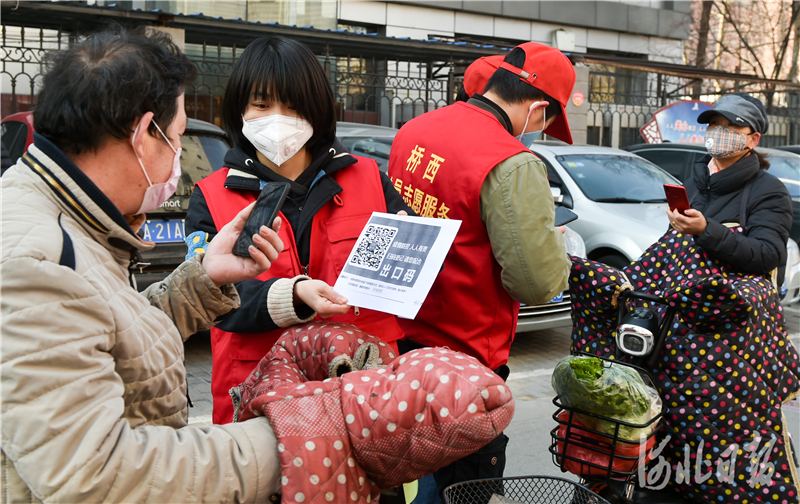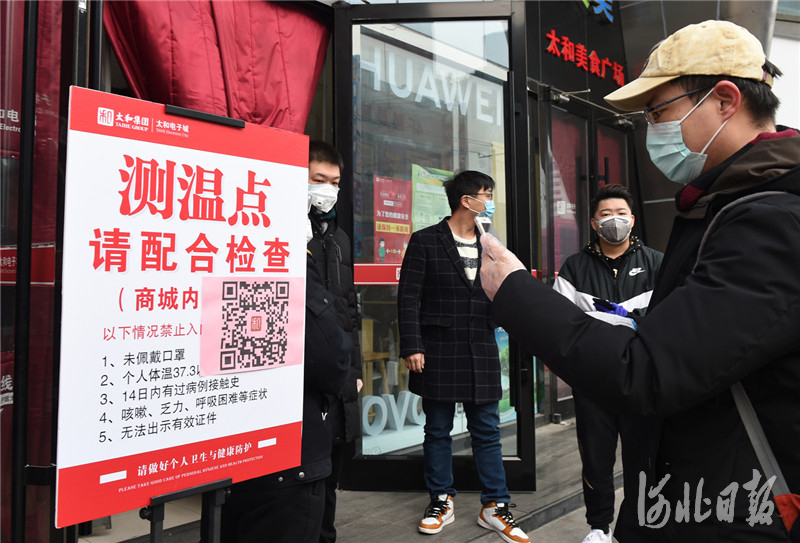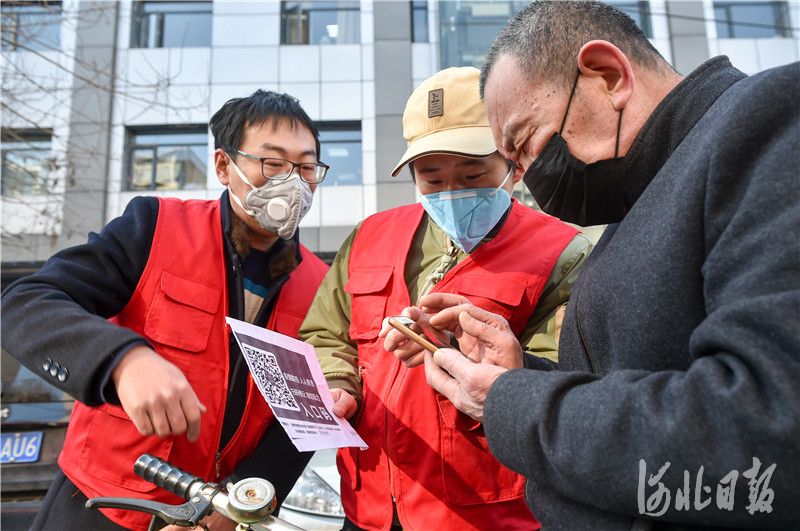More than 2.072 million people have applied for Hebei health code, and the "one code for the whole country" needs to be strengthened.
With the continuous acceleration of enterprises’ resumption of work and production, and the steady recovery of living order, the turnover of personnel has become more frequent. Under this background, the health pass code, a digital pass for all kinds of organs, enterprises and institutions and epidemic prevention and control checkpoints to comprehensively judge the personal health risk level and realize dynamic health certification in a special period, came into being.
Hebei actively coordinated and standardized the construction of health codes in the province, and used the national integrated government service platform "Epidemic Prevention Health Information Code" as the "Hebei Health Code". Many cities in the province also developed local health codes, which played an active role in epidemic prevention and control, effectively promoting the prevention and control of epidemic situation and the recovery of economic and social order in the province.
Hebei health code is applied in many places, which is convenient and fast.
Angelie Liu, a Shijiazhuang citizen who often commutes to work by bus, recently got used to scanning the code with his mobile phone after swiping the card on the bus and showing the scanned health code information to the driver. "Since the resumption of work and production, the number of passengers on the bus has increased significantly. The use of health codes is also for the sake of everyone’s health, and it is convenient and fast. I quite agree with this approach." Angelie Liu said.

On March 4th, in-service volunteers from party member, Youyi Street, qiaoxi district, Shijiazhuang, were helping residents to register through the "travel QR code". Hebei Daily reporter zhaojie photo
The health code in Angelie Liu’s mouth is "Hebei Health Code". The code is divided into three colors: red, yellow and green, which provides individuals with health risk classification for epidemic prevention. The reporter learned from Shijiazhuang Public Transport Corporation that Hebei health code scanning code registration has been fully implemented on more than 2,000 buses on more than 240 lines that have resumed operation in the city.
"With the Hebei health code, once a patient or suspected person is found to have taken public transport, the relevant departments can trace the information in time through the health code and quickly locate the potential infected person to realize early detection, early reporting, early isolation and early treatment." He Ruiyong, deputy director of the operation service department of Shijiazhuang Public Transport Corporation, said.
At 4 o’clock on the afternoon of April 2, the reporter saw at the entrance of Shijiazhuang Station of Shijiazhuang Metro Line 3 that before the people entering the station passed the security check, at the prompt of the staff, they needed to scan the travel QR code posted on the display board placed in front to show their personal health information. The station staff said that since the end of March, Shijiazhuang Metro has carried out a comprehensive promotion of Hebei Health Code. At present, information about Hebei Health Code is being pushed in real time by station broadcasts, site bulletin boards, electronic scrolling screens at subway entrances and exits or official WeChat Weibo, prompting the general public to use health codes when traveling.

On February 24th, merchants entering Taihe Electronic City in Shijiazhuang scanned the QR code with their mobile phones to check the information. Hebei Daily reporter Jia Hengshe
In addition, the reporter found through investigation that Hebei health code, as one of the valid vouchers for entry and exit, has been widely used in many public places in the province, such as shopping malls, supermarkets, residential quarters, etc. In some places, the "clear paper" for health code scanning registration has been posted in a relatively open position, showing in detail the operation steps of scanning code admission, helping the majority of personnel to realize "one code communication".
Since the health pass code was officially launched in Hebei on March 18th, citizens have authorized to log in to get the code, scan the code and display the code through the "Jishiban" WeChat applet, which not only ensures the results of epidemic prevention and control, but also greatly helps all walks of life in the province to restore production and living order in an orderly manner. By April 13th, more than 2.072 million people in the province had applied for Hebei Health Code, which brought great convenience for people to travel and enterprises to resume work.
Promote the cross-regional traffic of health codes and help to resume work and production.
At 4 o’clock on the afternoon of March 20th, two buses carrying 80 employees from Heilongjiang successfully entered Xingtai City and arrived at the gate of the North Company of China Construction Second Bureau-this is the first batch of returning workers from other provinces that the company has received this year. In just a few hours, 80 employees scanned the code one by one to register the "Xingtai Health Code" for information registration, and realized the mutual recognition of the "green code" after returning to work.
"This year, affected by the epidemic situation, the return of employees outside the province has been hindered to some extent. Since Xingtai health codes are mutually recognized, employees from other provinces can fully grasp the employee’s action trajectory and successfully achieve their posts as long as they register local health codes." Zhang Yan, deputy manager of Xingtai Midea State Guest House Project of China Construction Second Bureau North Company, told the reporter that at present, there are more than 300 employees from Heilongjiang and Sichuan who have returned to their posts, and all of them have registered local health codes. Looking at the company’s gradual rejuvenation, Zhang Yan’s heart is also steadfast.
The reporter learned that since February 26th, the "Xingtai Health Code" was officially launched on Alipay, and Xingtai became the first city in Hebei to enable health codes. Both local people and people from other places who come to Xing can search for "Xingtai Health Code" or "One Code for Xing" through Alipay to get the health code, which can be used as electronic certificate for returning to work, rework, returning to school, business trip and tourism, and realize "one-time declaration, universal use in the whole city, dynamic management and cross-domain mutual recognition".
Many places in Hebei Province have also accelerated the full coverage of health code applications, promoted the orderly flow across regions, and fully supported the resumption of work and production.
Zhangjiakou City issued the "Guidelines for Cross-regional Mutual Recognition of Health Codes in Zhangjiakou", giving detailed policy guidance for cross-regional mutual recognition of health codes in the city, speeding up the docking work of "mutual recognition, interoperability and sharing" with national codes, and completing the data docking of provinces, cities and counties as soon as possible.
Langfang City, in accordance with the national unified standards, relies on the effective docking of Langfang National Health Information Platform and government service platform to promote the use of "Langfang Health Code" in the whole city. Except for personnel from high-risk and medium-risk areas, other personnel will not be isolated before taking up their posts, and they can return to their posts after achieving "green code+normal body temperature" to realize cross-regional mutual recognition.
Shijiazhuang uses the national integrated government service platform "Epidemic Prevention Health Information Code" as "Hebei Health Code". Supported by the national data sharing interface, the code can realize mutual scanning and mutual recognition in Beijing, Tianjin and Hebei and the whole country, and ensure that one code is accessible. Inspectors can obtain the information and trajectory of independent health declaration through code scanning, and all data are uploaded to the national platform in real time for cross-regional code scanning application.
Implementing cross-regional mutual recognition of health codes is an important measure to promote the prevention and control of epidemic situation and the recovery of economic and social order. Hebei has taken a multi-pronged approach and taken multiple measures to accelerate the cross-regional mutual recognition of health codes. At present, it has established mutual recognition mechanisms for health codes with Hubei, Henan, Shaanxi, Hainan and other provinces to promote the orderly flow of people across provinces.
Accelerate the implementation in the province and upgrade cross-regional interconnection.
In the investigation, the reporter also found that in practice, on the one hand, different people have different attitudes towards health codes in different places, and there are individual blocking points in the implementation of health codes, which makes it difficult to land; On the other hand, the interconnection of health codes in different regions needs further upgrading and strengthening-
"Although the travel QR code was posted at the entrance of the community to encourage residents to use health codes more, since most residents in our community are elderly people, they rarely use smart phones, and their recognition of health codes is not high, so it is more difficult to promote them." Recently, the reporter came to the door of an old residential area in Chang ‘an District, Shijiazhuang City, and found that the doorman still managed the epidemic prevention card point by measuring the body temperature.

On March 4th, in-service volunteers from party member in Youyi Street, qiaoxi district, Shijiazhuang helped residents to register through the "travel QR code". Hebei Daily reporter zhaojie photo
"I have been informed that I can enter the community with my health code, but the doorman does not recognize it." Ms. Gao, who lives in a residential area in Yuhua District, Shijiazhuang City, said that residents can’t "walk away" just by "one yard in hand".
In addition, due to the different research and development platforms, the local health codes launched in different parts of Hebei still have problems such as data sharing and non-uniform mutual recognition mechanism, which brings inconvenience to the cross-regional flow of personnel and is not conducive to the full recovery of production and living order.
Recently, Wu Qian, a citizen of Xingtai, needed to go to Qinhuangdao for a business trip. However, when he arrived in Qinhuangdao, Mr. Wu’s local health code on his mobile phone was useless. He needed to re-scan the code to apply for the local health code and re-fill in his personal information, which made Mr. Wu, who needed to travel frequently for business, feel a little helpless. "Do you have to re-apply and fill in every place in the future?"
Epidemic prevention and control is a big test, and digital governance ability is one of the test questions. How to promote the full implementation of health code, benefit the practical needs of different people, and promote the cross-regional and cross-border implementation of "long-distance travel" of health code is an important content that needs to be solved urgently to promote the current epidemic prevention and control, personnel flow and enterprises’ resumption of work and production.
A few days ago, Hebei Province issued a notice explicitly requesting to build a provincial health code database based on the integrated government service platform of Hebei Province, to store the national and Hebei health declaration data, and to provide data sharing services for all parts of the province through the government service data sharing and exchange system. The health codes that have been built in all parts of the province should be technically reformed, make full use of the shared data and query verification interfaces provided by the provincial level, be guided by the needs of the masses, be safe and convenient, and expand service channels on WeChat, Alipay, self-built APP and provincial platforms to expand the coverage of health codes, facilitate residents to apply for and use them, and meet the application needs of different groups and scenarios.
In addition, in order to make health codes play a greater role, Hebei Province must further break down the information barriers between different regions and provinces, accelerate the cross-regional docking and mutual recognition of health codes, and enable residents to achieve "one code for the whole country" across regions. (Hebei Daily reporter Xie Chuchu)